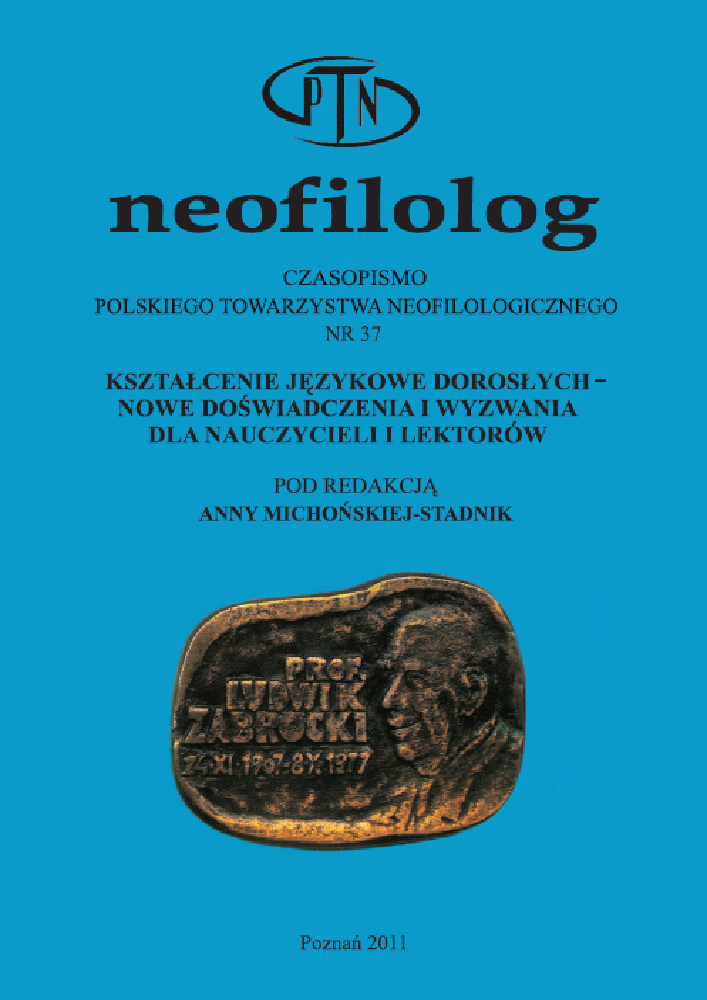Abstract
Globalization of business and use of English in corporations as lingua franca has resulted in growing demand for Business English courses in the workplace. This article tries to present a concise profile of an adult language learner in a broader context of adult education and the implications for the Business English classroom. The claim is made that if we want to provide tailormade courses for employees in companies a thorough analysis of their language needs should be carried out first. Explicitly discussed here are the types of adult learner needs in the business context and the methodology which may be employed in determining them.
References
Brinton, D. M., Snow, M. A. i Wesche, M. B. 1989. Content-Based Second Language Instruction. New York: Newbury House Publishers.
Bachman, L. F. 1990. Fundamental Considerations in Language Testing. Oxford: OUP. Cohen, R. 2001. „Language and negotiation: a Middle East lexi-con” (w:) Language and Diplomacy. (red. J. Kurbalija i H. Slavik). Malta: Diplo Projects: 67-92.
Crosling, G. i Ward, I. 2002. „Oral communication: the workplace needs and uses of business graduate employees”. English for Specific Purposes 21: 41-57.
Dictionary of Occupational Titles. 1991. Fourth edition, revised. Washington, DC: US Employment Service, US Department of Labor.
Dudley-Evans, T. i St John, A. 1998. Developments in English for Specific Purposes. A Multi-disciplinary Approach. Cambridge: CUP.
Ellis, M. i Johnson, C. 1994. Teaching Business English. Oxford: OUP.
Hutchinson, T. i Waters, A. 1987. English for Specific Purposes. Cambridge: CUP.
Knowles, M., Holton, E. i Swanson, R. 2009. Edukacja dorosłych. Warszawa: PWN.
Long, M. 2005a. „A rationale for needs analysis and needs analysis research” (w:) Second Language Needs Analysis. (red. M. Long). Cambridge: CUP: 1-16.
Long, M. 2005b. „Methodological issues in learner needs analysis” (w:) Second Language Needs Analysis. (red. M. Long). Cambridge: CUP: 19-76.
Reeves, N. i Wright, C. 1996. Linguistic Auditing. Clevedon: Multilingual Matters.
Stryker, S. i Leaver, B. 2007. „Content-based instruction: from theory to prac-tice” (w:) Content-Based Instruction in Foreign Language Education. Models and Methods. (red. S. Stryker i B. Leaver). Washington: GUP: 3-27.
Suchodolski, B. 2003. Edukacja Permanentna: Rozdroża i Nadzieje. Warszawa: PWN.
Taillefer, G. 2007. „The professional needs of Economics graduates: assessment and perspectives in the French context”. English for Specific Purposes 26: 135-155.
Vandermeeren, S. 2005. „Foreign language needs of business firms” (w:) Second Language Needs Analysis. (red. M. Long). Cambridge: CUP: 159-181.
License
Copyright (c) 1970 Paweł Sobkowiak

This work is licensed under a Creative Commons Attribution-NoDerivatives 4.0 International License.
Authors
Authors of texts accepted for publication in Neofilolog are required to complete, sign and return to the Editorial team’s office the Agreement for granting a royalty-free license to works with a commitment to grant a CC sub-license.
Under the agreement, the authors of the texts published in Neofilolog grant Adam Mickiewicz University in Poznań a non-exclusive, royalty-free license and authorize the use of Attribution-NoDerivatives 4.0 International (CC BY-ND 4.0) Creative Commons sub-license.
The authors retain the right to the free disposal of the work.
Users
Interested Internet users are entitled to use works that have been published in Neofilolog since 2017, under the following conditions:
▪ attribution – obligation to provide, together with the distributed work, information about the authorship, title, source (link to the original work, DOI) and the license itself.
▪ no derivatives – the work must be preserved in its original form. Without the author's consent, it is not possible to distribute the modified work in the form of translations, publications, etc.
Copyrights are reserved for all texts published since 2017.
Miscellaneous
Adam Mickiewicz University in Poznań retains the property right as a whole (layout, graphic form, title, cover design, logo etc.).
